Reply To:
Name - Reply Comment
Last Updated : 2024-04-24 09:57:00
Challenges ahead for women in the 21st century
As the world marks the 110th International Women’s Day today under the theme ‘Women in Leadership: Achieving an equal future in a Covid-19 world’, Daily Mirror Life Impulse spoke to a cross section of distinctive women in the country’s arts and media sphere – women who chose to take on incredible challenges to become who they are today. It is critical that barriers against women are dismantled and priority is given to develop solutions that will meet the needs of every woman to ensure a better society, better country and a better world for humans tomorrow. It’s all about empowering each other.
Text BY : Ramesh Uvais
THANUJA JAYAWARDANA
Fair gender portrayal in media should be an ethical aspiration
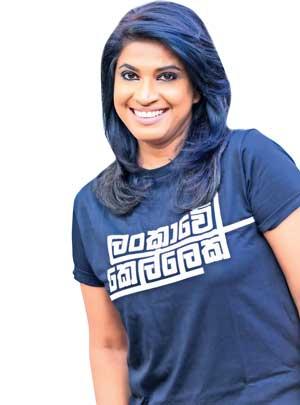 Gender equality still a myth in many parts of the world
Gender equality still a myth in many parts of the worldTelevision heartthrob Thanuja Jayawardana who has been actively engaged in the media for almost 25 years, is a young and influential woman driving for change to end gender discrimination and change stereotypes involving women.
She is a strong believer that bringing women together to learn from each other and achieve their goals, can make women a powerful force to create a better world.
Q: How can you create an empowered woman?
This can be done by placing women as leaders and giving them decision making roles. Invest in women’s entrepreneurial ideas, emotionally and financially. But empowerment should start from home and it should be included in our education system in schools and universities. Although many women are now powerful contributors to the economy of some states, gender equality is still a myth in the greater part of the world.
Providing women with leadership opportunities and making them a part of decision making can go a long way in achieving women’s empowerment.
Most women still don’t have access to good job opportunities and resources to get a better-paid job
The women empowerment programmes are investing abundantly in the welfare and empowerment of women, encouraging women to break free from their traditional roles and doing away with gender stereotypes.
Q: Do you think the media can play a bigger role giving more priority to gender issues?
There is a clear intersection between women’s empowerment and media development. The media were explicitly implicated in the second and third waves of women’s empowerment.
Fair gender portrayal in the media should be a professional and ethical aspiration, similar to respect for accuracy, fairness and honesty. Attention needs to be paid to identifying and addressing various gender imbalances and gaps in the media.
Studies have found that although the number of women working in the media has been increasing globally, the top positions (producers, executives, chief editors and publishers) are still very male dominated.
The Global Media Monitoring Project reports that throughout the world, female journalists are more likely to be assigned ‘soft’ subjects such as family, lifestyle, fashion and arts. The ‘hard’ news, politics and the economy, is much less likely to be written or covered by women. The level of participation and influence of women in the media also has implications for media content: female media professionals are more likely to reflect other women’s needs and perspectives than their male colleagues.
I don’t go by the rule book of the media. I am speaking up and using my voice on behalf of all the talented girls who represent the media, especially to stop mental harrasment aimed at them.
We have also seen unfair portrayals under-estimating the prowess of women in prime time tele dramas, taking cover under the pretext of promoting our culture. Local tele drama script writers should stop promoting violence through prime time tele dramas.
Q: Is there a need to develop a women-centric media culture in this country? If so why?
Compared to the past, there is a considerable change in women’s media representation and the new media culture, particularly advertising, has intended to represent women in a liberalized manner.
The media have also evolved into what they are today, starting with the newspaper in the nineteenth century, radio in early 1900s, television in the 1940s and the explosion of new technologies in the 1990s.
The fact is women are seriously under-represented in nearly all sectors of society across the globe, not just on screen, but for the most part, we are simply not aware about this reality and media images exert a powerful influence in perpetuating our unconscious bias.
There aren’t enough female experts in this field of media. It will not solve the problem of gender equality broadly. But it shows that change can result from embracing a growth mindset, providing a simple and tangible tool for achieving change without mandating it, and giving colleagues ownership over the process. Hope these insights will inspire others striving to reduce bias and fix underrepresentation of women in their workplace.
The aim of the Gender-Sensitive Indicators for Media is to contribute to gender equality and women’s empowerment in and through media of all forms, irrespective of the technology used. Media (newspaper, radio, television) and new technology are a part of culture and society. It is widely accepted that media are transmitters of culture and engines behind globalising cultures.
Furthermore, the conscious or unconscious biases that many media professionals, both men and women, sometimes have towards one-sided masculinist perspectives is partially due to the lack of capacity to report on women and gender more broadly.
Social diversity embodies a variety of complex characteristics of the human population such as language, culture, religion, race, ethnicity and gender. For the media to accurately mirror our societies and produce coverage that is complete and diverse, it is critical that the news in particular reflects the world in a way that goes deeper than a male-centric and stereotypical perspective.
Q:Why are modern women who lobby for gender equality seen as rebels or aggressive characters?
I think Gender Equality basically begins in the mind. It is an individual’s perception of treating another person on par with himself/herself.
It does not happen overnight – it’s more of a practice that you do every day. While gender equality quotes don’t translate into action directly, they are certainly words of wisdom for us to reflect on and make our own. Achieving gender equality requires the engagement of women and men, girls and boys. It is everyone’s responsibility.
Q: Do you think that today, social media provides a bigger platform than the traditional media to voice women’s issues?
Yes the ME TOO (#MeToo) Movement is the best example. The social media phenomenon that shed light on sexism across industries, including the humanitarian aid sector gave women a platform to speak out about sexual abuse. Social media encourages a more level playing field, allowing for the voices of women from a wider array of backgrounds and countries, with or without traditional power, to be heard. Indeed, social media has opened a new frontier for women’s rights.
For one, it encourages solidarity and emphasizes shared experiences. Social media has the potential to close this gap.
I don’t go by the rule book of the media. I am speaking up and using my voice on behalf of all the talented girls who represent the media, especially to stop mental harrasment aimed at them. We have also seen unfair portrayals under-estimating the prowess of women in prime time tele dramas, taking cover under the pretext of promoting our culture.”
Q: What are your views about the safety and security of women in cyberspace?
Well, I will provide an educational perspective to this. Don’t share anything more than what’s necessary. Relationships have only two shades in a spectrum – very good or very bad. Even the best of people can swing from one end of the spectrum to the other. That is why we should use caution when you share intimate messages, pictures, information or anything that has the potential to boomerang on you causing embarassment.
Don’t meet online acquaintances. In the recent past we witnessed tragic instances stemming from such affiliations. Be smart enough to escape from the clutches of maniacs and psychopaths. Never swap the little freedom for your self respect or self worth.
Block people you don’t want to interact with. Never feel weird declining friend requests from people you barely know. Trust your instincts and ignore, unfriend or block them. You get to choose who stays on your friend list. Don’t leave your webcam connected. There are too many apps capable of turning on your camera and slyly recording your movements without your knowledge. As a precaution disable camera permission and keep the lens of your camera closed or covered when not in use.
I will end this with a quote by Ida Pauline Rolf: “It’s not how deep you go, it’s how you
go deep.”.
SUMITRA PERIES
Women’s role deserves greater voice today
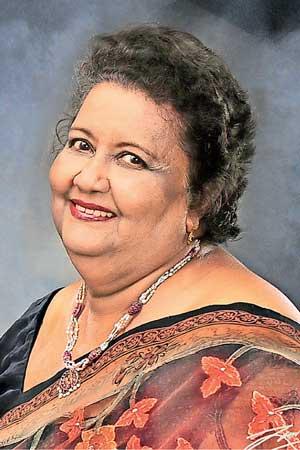 Sri Lanka’s first female editor and first technically qualified female director Sumitra Peries says Cinema or the visual communication system can play a big role in bridging the gender gap.
Sri Lanka’s first female editor and first technically qualified female director Sumitra Peries says Cinema or the visual communication system can play a big role in bridging the gender gap.
“It is a powerful medium. If you use it in the right sense it transcends language also. It can help reach people emotionally and make them aware of certain basic human qualities which are eluding today. Ultimately it’s so important to be a good human being. The world needs better human beings. I hope human beings will transform into better human beings,” said Ms. Peries.
Q: What is your view about gender issues?
Gender issues are there but I guess it has been softened a lot. The use or abuse of sexuality I feel is an individual choice that one takes. They might fall on the way sometimes but might also succeed at times.
What I can say for the next generation, they are at an at advantage compared to the older generation because they are open to the new world. With the Covid pandemic, the society and world is changing.
People are getting used to staying at home looking at each other and I hope there will be greater amity between the two sexes and women will be treated as equal human beings.
Q: How can girls make an impact to create a better world?
Girls should be armed with knowledge, skills and genuine experience to share with people and the desire to commit and dedicate. If they can do It, it will make some difference to their lives and those of others.
The Mother’s role is uppermost to groom and mould responsible citizens. A mother is a mother. The woman’s role is crucial and we have to give it greater voice. We have to cushion them a lot. Even the state must make an extra effort to do this.
Q: Talking of cinema and women…
World over women had very little chance of expressing themselves using the medium of cinema. There were backroom girls involved in make up or editing, but direction was male dominant from day one. I think primarily they felt the job required a lot of brawn more than brain. The need to handle heavy equipment could have been a possible reason. It was not considered an art form at that time but as intelligent people got in, creativity came in.
Cinema was predominantly male dominated because of the nature of the medium, I presume. Or they wanted to put women on the pedestal, portraying them as objects of beauty. The perception of the female image also must have been different at that time. With the passage of time people became more realistic.
Q: Your entry to cinema as a young girl…
Our cinema started in 1947 and I was then a schoolgirl. Ruby de Mel and Florida Jayalath emerged as female directors. When I went to study cinema in the fifties, I hadn’t seen a single Sinhala film. Even at home or school, cinema for me was side lined. When I got in I had seen good films.
The films that came to the normal circuits were quite good. People who had some access to information could imbibe a lot by seeing such films but our sources were limited unlike today. Men or women are luckier today since they have easy but quick access to knowledge. As a result, the levels of commitment and dedication are very limited. I came from sort of a revolutionary background and cinema must have been something working behind me. I was not a good public speaker and I thought I was not good enough to face a camera. So I must have been looking for a medium through which I could hide myself and express myself. Those things must have been in the unconscious.
We did not have the inputs. I came from a conventional family and my mother died when I was just 12 or 13. If she didn’t die I might not have liberated myself.
Q: Your destiny after meeting Lester…
After I went to Europe I wanted to do documentaries as I thought I was not a good writer. My brother sent me to Switzerland. When I met Lester with Rekhawa that was the first Sinhala film I saw. I remember selling tickets and ushering the people at the screening. It was Lester who asked me why I didn’t go to London to study films. So, I went to London. At the London school of Film Technique I was the only female student.
There were females involved in editing. Men came into editing once they discovered that editing also had a creative input. I personally feel editing is the fundamental element in a cinematic creation for anybody to understand the language and grammar of cinema.
Q: Working with Lester for the first time..
Then I came back to work in Sandeshaya and I was the only female who stayed for months roughing it out in village huts. I guess dedication is so important even at this time. Cinema like any other profession, has to open up. Initially I don’t think women were side lined in cinema but they must have wanted the prettier ones to be on screen. When I came in, because I was considered to be qualified, they had respect for me.
When we did Gamperaliya I earned my rights by chipping in money for the production and became the director of the company. I must have been around 24 or 25 then. More than a gender issue, I earned my rights as a human being. For me things never came on a platter. You have to struggle. But luckily I came in at a time when the arena was fairly open. Though I was privileged by birth, my progress largely depended on my degree of commitment and dedication.
Today I don’t think every young girl would have the advantage that I had. You have young talent and they are all vying for a place. The gender issue was there during my time but people didn’t have to use it. When you are narrowing down your chances, every little aspect comes to the surface, whether it is gender, language or caste.”
Q: The scenario today…
Today I don’t think every young girl would have the advantage that I had. Today you have young talent and they are all vying for a place. The gender issue was there during my time but people didn’t have to use it.
When you are narrowing down your chances, every little aspect comes to the surface, whether it is gender, language, caste or colour.
I am lucky that I was born in an era when you could breathe and get the feel of what life is all about without having to walk on other people’s toes. But I am sorry that I was born in an era which gave us little access to technology and knowledge. Even at this age I am learning how to use today’s technological features. I am learning for the joy of learning.
In today’s competitive world being a female would stand as a bigger disadvantage than in the past.
We had the good fortune of meeting and associating with good human beings.
Lucky I got somebody like my husband Lester who helped me in every way. He was never biased. He never accepted some things that were offered to him.
The Ambassador’s position in France was offered to him by President Chandrika Kumaratunga. But he said it’s better if I go since I knew some French and also representing a country headed by a female President was significant for a female. He has made such sacrifices.
YAMUNA MALINI PERERA
Every woman is blessed with an exceptional power
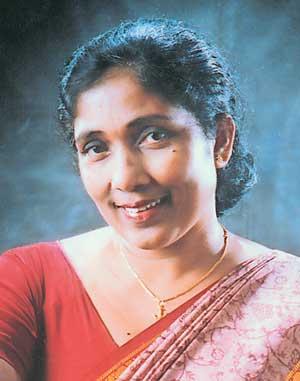 Renowned lyricist Yamuna Malini Perera believes that every woman possesses an exceptional power and they should exploit such clout through commitment and dedication.
Renowned lyricist Yamuna Malini Perera believes that every woman possesses an exceptional power and they should exploit such clout through commitment and dedication.
“In today’s society the creative power of women begins to fade off with marriage. Such women who take a backseat after marriage consider it as a sacrifice to strengthen the marital bond. In some cases their husbands don’t encourage them to pursue their creative talents after marriage. They are expected to be a good wife and good mother. In my case I was fortunate to have a husband who valued creative talents, principally because he was also an artiste.
I had written poems and shorts stories, but I emerged as a lyricist only after marriage. My husband won a scholarship to Russia after our marriage. Our only mode of correspondence was letters. My first song ‘Ahasa Polowa Watapitawa’ was part of one such correspondence between us. From then onwards I continued to write songs to many popular singers.
We have seen many creative women who excelled as writers even after marriage. I believe that women should be given their right place for them to grow. Ancient literature had stereotyped women in a manner but fortunately today many men are open minded with regard to their sensitivities towards women. I feel men have the responsibility to motivate the talents of their wives. Everything depends on mutual understanding between the two.
Though I did not realise the gravity then, there were times when I was also marginalised simply because I was a woman. But I know that people discriminate us when they realise that we possess something more than they do. I never hurt myself or look at such people in a revengeful manner. I always remember the down to earth attitudes and exceptional humane qualities of the late wordsmith Dharmasiri Gamage. I was in fact inspired by his humility and simplicity. He used to always advise us not to give up our creative talents just because life treats us harshly at times. I am still a learner. My best is yet to come.
Today the creative power of women begins to fade off with marriage. Such women who take a backseat after marriage consider it as a sacrifice to strengthen the marital bond.”
SUMITHRA RAHUBADDA
Gender Equality is a social responsibility
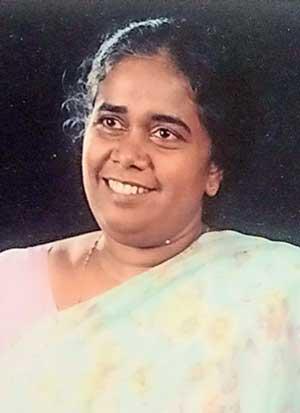 Award-winning author Sumithra Rahubadda has used her writings to serve as an eye opener to society, especially to rectify anomalies existing in the social strata.
Award-winning author Sumithra Rahubadda has used her writings to serve as an eye opener to society, especially to rectify anomalies existing in the social strata.
Q: Has your journey in this male dominant field been a smooth one?
It was not easy as a writer, perhaps because of the earliest misconception that women’s place was in the kitchen. There were a few women who excelled in writing when I entered this sphere and among them Eva Ranaweera was an inspiration. Later on she has told me that it was a rugged journey for her too. Even today, women’s journals and weeklies focus on cooking, sewing and teaching her to become a good wife. I published my first novel ‘Bumuthurunu’ in 1978 and I am grateful to my parents and the home atmosphere for giving me that freedom and enthusiasm. From the society’s point of view, a woman will only write only till she gets married. And if a woman continues to write after marriage the first question people would ask her is ‘Are you still continuing to write?’. My university stint and my occupations provided me the luck and luxury to read extensively. My first novel received amazing feedback from critics of that time it is they who promoted my novel. Today writers have to do everything by themselves to promote their books. I never do it even today. But things were not rosy after I became an authoress. I am honestly against this terming of author and authoress. That itself amounts to gender bias.
Q: Aren’t most of your novels woman-centric?
Yes, most people say so. But I regret that they have never noticed male character elements in my novels. So, I was labelled as a feminist writer. But they do not even know its real meaning. There’s a famous quote that men only write on what they know and what they can, but women write on what men don’t know and what men can’t. This is why many see pro-women facets in my novels. For example, my novel ‘Kelimadala’ or any other have a mix of male and female characters. From ancient times, men wrote about women from their own perspectives giving women a not-so-good image. But they never attempted to analyse the real woman, they never wanted to fathom the woman. When a woman breaks free from the traditional, stereotyped structure, she is looked upon differently. Such women were sarcastically branded as women trying to be men. I was accused of trying to create unwanted problems about women. All this is triggered due to issues relating to attitudes. Today though we assume slavery is no more, doesn’t it exist in different facets even in so called developed countries? If not why are people being discriminated by their gender, colour, race or religion? They can’t reach the top beyond a certain ceiling. Males and females differ only biologically.
Q: You once created a programme to engage men in this issue?
Yes, when I was Secretary to the Women’s Affairs Ministry I started a project called ‘Piriminta Pamanai’ (For Males Only) to educate men on the injustices meted out to women. Not only men, the entire society must stand up to rectify gender equality and raise their voices against harassment and sexual abuse involving women. When mothers leave their children behind and seek overseas jobs, their girls especially become prey to men from their own families. There’s no point in women meeting women at five star hotels, unless we can seek a practical solution to this dangerous trend.
When a woman breaks free from the traditional, stereotyped structure, she is looked upon differently. Such women were sarcastically branded as women trying to be men.”
INDUNIL DISSANAYAKE
I always believe in giving and getting respect
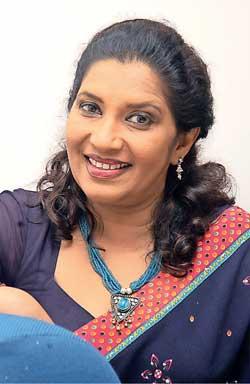
Pioneer television presenter Indunil Dissanayake who has many firsts to her credit in the TV scenario is one sparkling personality who has not lost her Midas touch in convincing the masses.
“As humans it’s true we grow old but personality wise or career wise, it’s not easy to endure in this field or any other field for that matter. I got some wonderful support from my husband, his parents and my parents to engage in my profession. I always give top priority to my family. But when it comes to work, everything takes a backseat and I only focus on my work,” she said.
I have never been a permanent employee throughout my life. I have been working as a freelancer for the past 40 years. I am completing my 40th anniversary in my career this month.
I first appeared on the television screen on March 23, 1981 on ITN. Sumana Nellampitiya Akka was there just two days before me on March 21.
We shared the Siv Digin programme on alternative days while Vijaya Lakshmi did it in Tamil In 1982 we moved to Rupavahini, together with Ravinatha Ariyasinghe, Noeline Honter, Eric Fernando and others. In 1983 I started the first musical programme Madu Rasanga on ITN. I must say that I was fortunate to be the first female to appear on Sirasa TV, Swarnavahini and also the first female voice to go on air on TNL. They are significant milestones in my career.
As a female in this field I never faced any obstacles, probably because there was no competition but we fully dedicated ourselves to our jobs. We were so confident.
It’s not easy to portray yourself on TV if you are not happy within because your face reflects your heart. I am grateful to my husband for giving me that freedom. I never depended on anyone and was not under obligation to any person.
I appreciate the younger generation in my field and they are so lucky because they have more access to information unlike our days.
Speaking of women’s rights, I think a woman has got the most significant right of being a mother. I believe in a father-centric, male-centric family structure and by giving due respect and I have got respect in return. There is no point even if you are the queen to the world if you are not the queen at home.
Well, there is an imbalance in my field in TV presenting and even in the music scene.
I am glad that there are talented television presenters now but how many of them have made a name for themselves. After my generation, only a few like Kingsley Rathnayake, Thanuja Jayawardana, Harendra Jayalal, Narada Bakmeewewa, Dinusha Rajapathirana, Jayantha Athapattu and a few others have emerged as notable names in the television sphere.
We have not seen anyone else making such a big impact, probably due to the emergence of more channels and more competition obviously. Now TV personalities simply and come and go. To remain in the hearts of people is not an easy task.
As a female in this field I never faced any obstacles, probably because there was no competition but we fully dedicated ourselves to our jobs. We were so confident. It’s not easy to portray yourself on TV if you are not happy within because your face reflects your heart. I am grateful to my husband for giving me that freedom. I never depended on anyone and was not under obligation to any person.”
RENUKA BALASURIYA
Woman at the helm should have a good vision
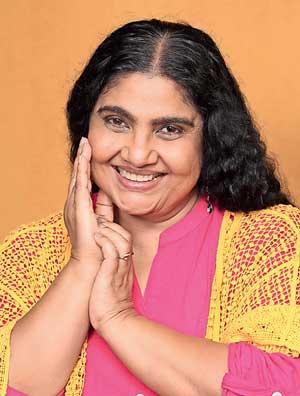 Well known presenter and one-time actress Renuka Balasuriya has made a huge impact in the Sinhala cinema industry as a producer of widely acclaimed movies.
Well known presenter and one-time actress Renuka Balasuriya has made a huge impact in the Sinhala cinema industry as a producer of widely acclaimed movies.
She says she did not face any major obstacles as a female film producer, largely because she entered the industry having made a reputed name for herself.
“The prestige I already established as an artiste was a decisive factor when I came to films. On the other hand as a film producer I was the one who wielded power, so nobody tried to challenge or dispute me. They had to fall in line with our ways of working to survive. I always believed in working in harmony with everyone, treating everyone with equal respect. So people helped me in return,” she said.
The task of being a producer became hassle free for me because I was a woman. We worked with about 100 to 200 people on the sets for months. I was able to balance everything well because I was a woman. We never had disputes or frictions in our film projects, besides the hurdles that came as natural disasters. I was able to promote team spirit which took us a long way. A woman at the helm should be a good leader with a good heart and good vision.
A woman should be taught to be strong from her early childhood. It should begin from home. She should be taught to be self-confident.Families should open up and talk with girls openly. She must be allowed to ask questions without any fear. Many issues are triggered due to this.”
Even as a presenter I respected each and everyone. I never faced discrimination as a presenter but there were times when the lion’s share of presenting went to the males, though we could have done it equally well or even better. They are rare cases when men get the upper hand. I was the only female among 16 men when TELINISA started in 1992.
A woman should be taught to be strong from her early childhood. It should begin from home. She should be taught to be self-confident. Families should open up and talk with girls openly. She must be allowed to ask questions without any fear. Many issues are triggered because children don’t get this backing from her home. The mother has to play a pivotal role in this regard. As a young girl I used to go out alone at 4 am to pick flowers for offerings. But today can a girl go out alone even at 10 am?
Girls should be groomed with a good knowledge about life. Our education system should also contribute to such changes. Unless these changes take place no amount of legislations can help find solutions to issues concerning abuse on girls and women.
ANOMAA RAJAKARUNA
My creations are reactions to what I experienced
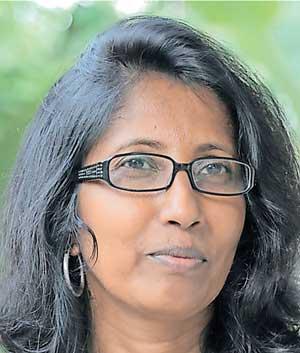 Internationally acclaimed filmmaker, film promoter and multi-faceted social activist Anomaa Rajakaruna has always stood up for the marginalised, oppressed and critically exposed gender disparities in her creations.
Internationally acclaimed filmmaker, film promoter and multi-faceted social activist Anomaa Rajakaruna has always stood up for the marginalised, oppressed and critically exposed gender disparities in her creations.
“If one wonders why my creations are pro-women or pro-minority, highlighting inconsistencies in a social structure where women lack the freedom to make decisions for themselves, I would say that I am just reacting to all what I experienced in my early life as a girl,” said Anomaa.
“I am an only child, but I felt in my extended family and the place I grew up in Panadura, that girls were treated differently than boys. It still remains the same. In society or even in the education system girls are expected to behave in a constrained manner. Even the subjects that we need to study are decided by others on behalf of us. This happened to me at school and I was forced to study in a stream that I never aspired. When we were given a choice to choose two pre-vocational subjects, I chose pottery and weaving but the school higher ups decided that I should take up business studies and marketing. When I wanted to follow the arts stream later, I was forced to do Maths against my wishes,” she said.
Q:How did you make inroads to television?
The advent of television in Sri Lanka in 1979 fascinated me so much. I was anyway into small time photography, read a lot of books on cinema, but this new TV media really mesmerised me. I did a script writing course at the Institute of TV technology and later registered myself with the inaugural Practical television production course conducted by the OCIC. I was the third student to be registered and the only female. They were to only take in 16 students. But sadly they enrolled 16 males and dropped me out citing my age, size and of course my gender. They told me the equipment were heavy which my body structure could not stand, virtually indicating that I was not strong enough as a female. I was just 17. never gave up. It was veteran cinematographer Andrew Jayamanne who intervened and convinced Rev. Fr. Benedict Joseph to enrol me as the 17th student to that course which only had me as a female. So, this is how the journey started. But interestingly it was I who won the first place at the contest organised by the OCIC when it marked its tenth anniversary.
Q: And then you moved to films?
It was not that easy. Training at the television training institute was limited to the employees of Rupavahini and ITN. My family didn’t support or encourage me. I only had the little pocket money that I saved. Initially I started making short films using expired film stock. Super 8 cartridges were very expensive. I had to post them to Germany to get them developed. My first three films were shot on that using expired film stock. Then I started using umatic to make short films
Q: What kind of feedback did your first three short films or tele films receive?
They were barred. As a student I took my first short film to Rupavahini. There were no selection panels or boards to scrutinise creations. There was just one person who rejected it and asked why I was making films on women’s issues instead of making films for children. I took it to ITN and they telecast it.
Then I made another for the first time featuring Nihal Silva together with Radha de Mel and Veena Jayakody. It was rejected and banned again. And this time Rupvahini went a step further to inform ITN that they had rejected my short film. So I could not get it telecast on ITN too. It is then that I made sure not to give my third film to these channels here. I started making films and sending them abroad. Going global was my kind of reaction to this whole control system. Things went against me because of my physical structure and because I was a girl.
Q: The rejection eventually came as a blessing in disguise?
Indeed. That was the turning point in my career. It paved the way for me to get international recognition. In my early twenties I won two awards from Moscow and Finland The creations I make are reactions to what I was experiencing. I also remember working in my films with senior male cinematographers who never wanted to frame the shots my way. It was a struggle largely because of a woman coming in to a male dominant sphere.
They were to only take in 16 students. But sadly they enrolled 16 males and dropped me out citing my age, size and of course my gender. They told me the equipment were heavy which my body structure could not stand.”
This is why I create platforms for young women even in the Agenda 14 Festival. But I must gratefully mention that there were a few senior critics who encouraged me also. Cinema has always been my passion. I am a social science researcher academically, especially focusing on gender displacement. My Masters was on Sociology. Even my poetry, photography and documentaries had a gender focus.
Q: What role can a man play to rectify these gender discrepancies?
I always feel the male role to rectify gender anomalies is so vital. We need to engage men in this issue. It is important to understand the biological differences that exist between a man and woman. The gender roles need a big shift now. A man can take a step back and share the work load of a woman for a short period. I see this happening in the new generation. As a society if we respect and appreciate such initiatives by men, things will certainly change. Getting men engaged in this whole gender dialogue is the only way to defuse these gender disparities. Talking about women’s rights among women in small compartments is not going to yield viable results. The media also has a big role to play. A gender sensitive code of conduct is important for the media.
KAUSHALYA FERNANDO
Some can’t stomach when women succeed braving all challenges
 We asked award-winning theatre personality Kaushalya Fernando how easy or hard was it to excel in Theatre as a female.
We asked award-winning theatre personality Kaushalya Fernando how easy or hard was it to excel in Theatre as a female.
“Personally for me it was advantageous that my mother and father were both into the arts and theatre. They were aware of its values and those ideals were imbibed in me too. I acted in theatre and of course some films and tele dramas, but especially in the theatre sphere I did not face significant obstacles largely because my parents were known to many. But being the daughter of veterans will not take you far unless you possess some skills. So I was blessed with something and I hardly faced any harassment as a woman. But I was subjected to rejection at times, just because I was the daughter of my parents.
At the same time, I stuck to maintaining a disciplined lifestyle and that indeed stood in my favour. Traditionally in a country like ours we are segregated from our childhood, with separate schools for boys and girls. A perception existed that boys are different to girls. Then came various opinions how girls and boys should do things. These gender issues in society in fact stem from chauvinistic approaches. For a woman to take an independent stand was no easy task. But as an artiste, be it man or woman, independent space is so crucial. Then comes the dangerous part when people tend to assume that a woman who is alone can be easy prey and that they can be exploited.
When I was in Netherlands on a theatre mission, I remember walking back to our accommodation even at around 1 am but we had no iota of fear. Females freely walked alone at any time and none dared to even glance at them. The respect for women in those countries was amazing but sadly much has to be done here to imbibe such values in our society.
Even during my mother’s era, women entering the field of arts was virtually a taboo. Before Amma was married there were times when my grandmother turned back well known dramatists who came to pick my mother for theatre performances. But she was able to regain that freedom after her marriage.
Women were treated with respect then but today the situation has deteriorated due to gender inequality or lack of awareness. Just imagine the way the image of women is shamefully degraded on social media.”
Women were treated with some degree of respect then but today the situation has deteriorated to dangerous levels, largely due to gender inequality or lack of awareness. Just imagine the way the image of women is shamefully degraded on social media and other gossip columns. Some people can’t stomach when women emerge successful, braving all challenges and obstacles. I feel this all stems from sexual jealousy.
I followed a disciplined lifestyle and during my days we were chosen on merit. But today it is different. Those who come to act have their own agendas just like the people who select the girls for a project. Many think girls can be used. On the hand young girls go all out to show themselves on social media platforms, reminding prospective producers or directors that they exist. This may be a global phenomenon but it’s not a healthy one at that. Another factor is the discrimination within families where males are encouraged and females discouraged to work in theatre. Some mothers go upto the extent of even pawning their jewellery to encourage their sons but not the daughters. We have talented female dramatists but their productions are most of the time limited to festivals since they can’t sustain without outside support.
As a theatre personality I am more interested in contributing something to society than accumulating things for me.
SUMANA NELLAMPITIYA
I never faced gender issues
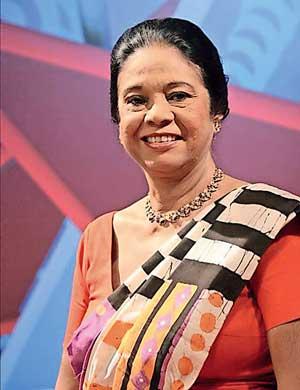 Senior radio and television personality Sumana Nellampitiya who was the country’s first television presenter, said she personally felt women were treated in an unbiased manner during her
Senior radio and television personality Sumana Nellampitiya who was the country’s first television presenter, said she personally felt women were treated in an unbiased manner during her
tenure at SLBC and later at Rupavahini Corporation.
“I started my media journey at SLBC in 1967. In 1982 I joined the Rupavahini and I was its first Sinhala presenter. Despite being a male dominated field, I wouldn’t have got that opportunity if gender inequality prevailed then. Even at SLBC we shared work irrespective of our gender. There was no male dominance. At the same time we put in our 100% to our work. There were hurdles, obstacles, challenges and competition but they are common to both male and female,” she said.
“ I have done diverse programmes on Rupavahini and faced many challenges while discharging my duties. I remember how I and my team were booed and attacked by some protestors during the period when the Indo-Lanka Accord was signed. At work it does not matter if you are male or female. But I always say women who join the field of media must be bold and ready to commit themselves to work. We were inspired by seniors like Prabha Ranatunga, Rathna Lanka Abeywickrema, Daya de Alwis, Chandra Wayaman and others. After my generation we had committed characters like Chitra Kumari Kalubowila and Nelum Kalubowila. But things appear to be different today. I assume today’s youngsters hesitate to accept challenges and commit themselves to hard work. They are not loyal to their work or work places. So we mostly see media persons laughing and talking meaninglessly with no depth or purpose, but there are a handful of exceptional persons who excel in their professions.”
At work it does not matter if you are male or female. But I always say women who join the field of media must be bold and ready to commit themselves to work. We were inspired by seniors.”

Add comment
Comments will be edited (grammar, spelling and slang) and authorized at the discretion of Daily Mirror online. The website also has the right not to publish selected comments.
Reply To:
Name - Reply Comment
US authorities are currently reviewing the manifest of every cargo aboard MV
On March 26, a couple arriving from Thailand was arrested with 88 live animal
According to villagers from Naula-Moragolla out of 105 families 80 can afford
Is the situation in Sri Lanka so grim that locals harbour hope that they coul